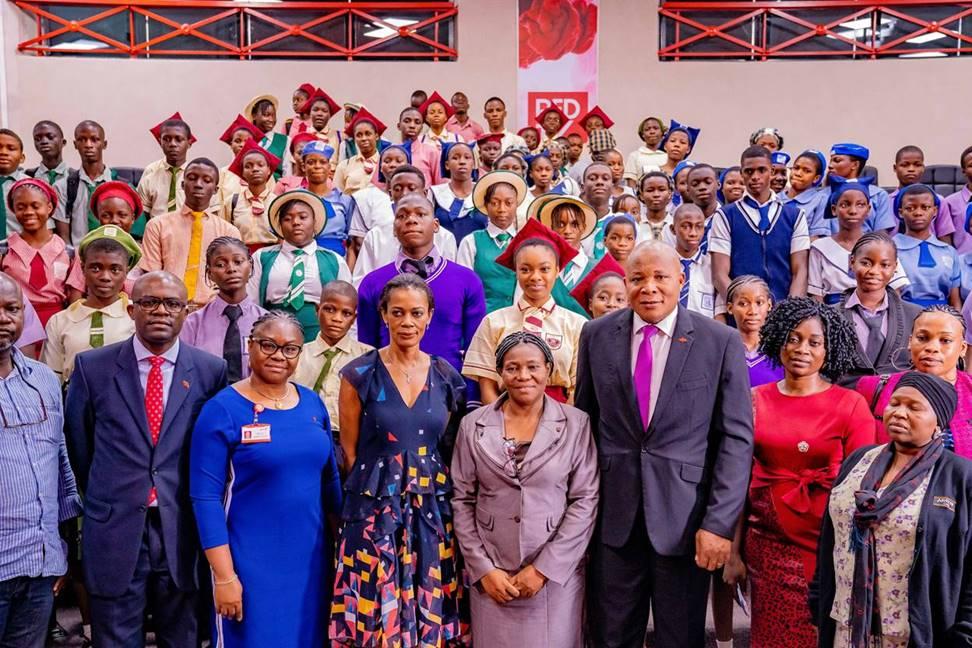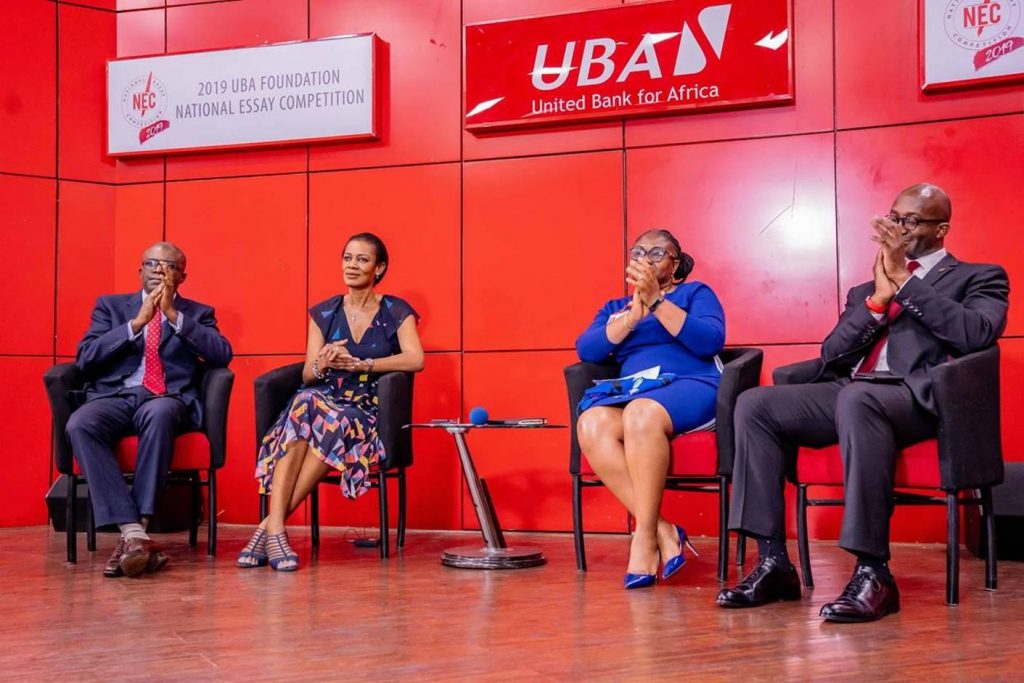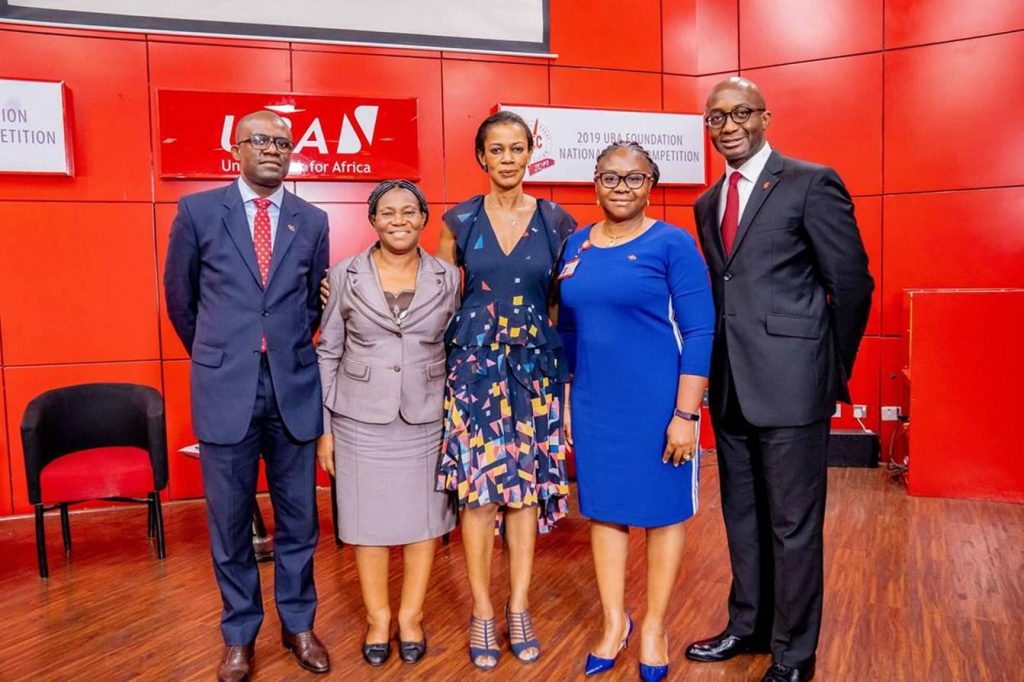Business
UBA Foundation’s National Essay Competition 2019 to Reward Schools with Highest Entries

UBA Foundation, the corporate social responsibility arm of the United Bank for Africa (UBA) Plc, has commenced the 2019 edition of its annual National Essay Competition in Nigeria with a call for entries.
Now in its 9th year, the essay competition, targeted at senior secondary school students in Nigeria is organised annually, as part of UBA Foundation’s education initiative which is aimed at promoting the reading culture and encouraging healthy and intellectual competition amongst secondary school students in Nigeria and across Africa.

l-r: Group Head, Brand Management, United Bank for Africa(UBA) Plc, Mr. Lashe Osoba; Managing Director /CEO, UBA Foundation, Mrs Bola Atta; Group Head, Direct Sales Agency, UBA Plc Ogechi Altraide; and Group Head, Energy and Oil, UBA Plc, Mr. Ebele Ogbue, during the commencement Ceremony for the 2019 UBA Foundation National Essay Competition for senior secondary school students in Nigeria held at UBA House on Tuesday
At the media launch which took place at UBA headquarters in Lagos, the call for entries was announced today. Speaking at the event, the Chief Executive Officer, UBA Foundation, Mrs. Bola Atta, said the essay competition, which is in its ninth edition, will provide an opportunity for students in secondary schools across the country to put in their entries and to win prizes in the form of educational grants to study in any university of their choice on the African continent.
Beginning from last year, the prize money increased significantly as the UBA Foundation emphasises that education remains one of the foundation’s key initiatives.

Group Head, Brand Management, United Bank for Africa(UBA) Plc, Mr. Lashe Osoba; English Teacher, Holy Child College, Ikoyi, Mrs Ezechukwu Ngozi; Managing Director/CEO, UBA Foundation, Mrs Bola Atta; Group Head, Direct Sales Agency, UBA Plc, Ogechi Altraide; Group Head, Energy and Oil, UBA Plc, Mr. Ebele Ogbue, during the commencement Ceremony for the 2019 UBA Foundation National Essay Competition for senior secondary school students in Nigeria held at UBA House on Tuesday
The first prize for the UBA National Essay Competition is a N2 million educational grant, while the second and third prizes are N1.5 million and N1m educational grants respectively.
Speaking to the students and participants at the event, Bola Atta said, “To us at the Foundation, this is our drive to improve the quality of education across the continent. It is also our way of giving back to the society. The competition is a key aspect of our investment drive in human capital, as we seek to improve knowledge base, allow students to express themselves and write creatively. We will continue to sustain the initiative because education is very important to UBA and we are more than committed to providing the necessary support for students in Nigeria and across the African continent,” she noted.
“We are driven by the mantra to do well and do good and we will not relent in our efforts to touch lives through our various projects, and initiatives,” Bola Atta told the excited students.
Explaining the modalities for the competition, she stated that entries received from students for the competition will be reviewed by a distinguished panel of judges made up of professors from reputable Nigerian Universities, who will then shortlist 12 best essays for further assessment.
Following this, a second round of the competition will involve the 12 finalists who will write a second supervised essay from which three best essays will be selected as the overall winners from the 12 finalists emerged from the first round of the competition.
Atta explained that the choice of essay for this year’s competition is one that helps promote creative and analytical thinking in students and helps them to be problem solvers. This year, the topic is “What do you think the government should do to control fraud in Nigeria?”
It is important to note that apart from Nigeria, the national essay competition has been taken to other African countries including Ghana and Senegal. More countries including Mozambique and Kenya will kick off the initiative this year. A unique component of this year’s edition is that, schools that turn in the highest number of entries will be recognised and rewarded a special prize by the Foundation.

Group Head, Brand Management, United Bank for Africa(UBA) Plc, Mr. Lashe Osoba; English Teacher, Holy Child College, Ikoyi, Mrs Ezechukwu Ngozi; Managing Director /CEO, UBA Foundation, Mrs Bola Atta; Group Head, Direct Sales Agency, UBA Plc Ogechi Altraide; Group Head, External and Media Relations, UBA Plc, Mr. Ramon Nasir, flanked by students and teachers of some selected secondary schools in Lagos during the commencement Ceremony for the 2019 UBA Foundation National Essay Competition for senior secondary school students in Nigeria held at UBA House on Tuesday
Also speaking at the call to entries today, the Group Head, Direct Sales Agency, Ogechi Altraide, who spoke on the benefits of reading and writing essays, motivated the students to research into the topics and give it their best shot, adding that there is the need for them to focus on adapting themselves to happenings in their generation, and to have a growth mindset. This she explained, will ensure that they can apply themselves and conquer whatever challenges they are faced with.
According to her, reading and writing go hand in hand, and so it is important for students to keep abreast of how the economy can develop through reading and writing.
An English teacher from Holy Child College, Ikoyi, Mrs Ezechukwu Ngozi, gave the students tips on how to write good essays, and advised them to keep to the proper tenets of essay writing to come out tops in the competition.

Managing Director /CEO, UBA Foundation, Mrs Bola Atta; Group Head, Direct Sales Agency, United Bank for Africa(UBA)Plc, Mrs Ogechi Altraide; Group Head, Brand Management, United Bank for Africa(UBA) Plc, Mr. Lashe Osoba, flanked by students of some selected secondary schools in Lagos during the commencement Ceremony for the 2019 UBA Foundation National Essay Competition for senior secondary school students in Nigeria held at UBA House on Tuesday
As the CSR platform for the UBA Group, UBA Foundation embodies the Group’s CSR objectives and seeks to impact positively on societies through a number of laudable projects and initiatives.
Each year, the bank donates thousands of books to students in Nigeria and across Africa, under the ‘Read Africa’ initiative to encourage and promote the reading culture in secondary schools.
Business
Nigeria’s Inflation Drops to 15.10% as NBS Reports Deflationary Trend

Nigeria’s headline inflation rate declined to 15.10 per cent in January 2026, marking a significant drop from 27.61 per cent recorded in January 2025, according to the latest Consumer Price Index (CPI) report released by the National Bureau of Statistics.
The report also showed that month-on-month inflation recorded a deflationary trend of –2.88 per cent, representing a 3.42 percentage-point decrease compared to December 2025. Analysts say the development signals easing price pressures across key sectors of the economy.
Food inflation stood at 8.89 per cent year-on-year, down from 29.63 per cent in January 2025. On a month-on-month basis, food prices declined by 6.02 per cent, reflecting lower costs in several staple commodities.
The data suggests a sustained downward trajectory in inflation over the past 12 months, pointing to improving macroeconomic stability.
The administration of President Bola Ahmed Tinubu has consistently attributed recent economic adjustments to ongoing fiscal and monetary reforms aimed at stabilising prices, boosting agricultural output, and strengthening domestic supply chains.
Economic analysts note that while the latest figures indicate progress, sustaining the downward trend will depend on continued policy discipline, exchange rate stability, and improvements in food production and distribution.
The January report provides one of the clearest indications yet that inflationary pressures, which surged in early 2025, may be moderating.
Bank
Alpha Morgan to Host 19th Economic Review Webinar

Alpha Morgan to Host 19th Economic Review Webinar
In an economy shaped by constant shifts, the edge often belongs to those with the right information.
On Wednesday, February 25, 2026, Alpha Morgan Bank will host the 19th edition of its Economic Review Webinar, a high-level thought leadership session designed to equip businesses, investors, and individuals with timely financial and economic insight.
The session, which will hold live on Zoom at 10:00am WAT and will feature economist Bismarck Rewane, who will examine the key signals influencing Nigeria’s economic direction in 2026, including policy trends, market movements, and global developments shaping the local landscape.
With a consistent track record of delivering clarity in uncertain times, the Alpha Morgan Economic Review continues to provide practical context for decision-making in a dynamic environment.
Registration for the 19th Alpha Morgan Economic Review is free and can be completed via https://bit.ly/registeramerseries19
It is a bi-monthly platform that is open to the public and is held virtually.
Visit www.alphamorganbank to know more.
Business
GTBank Launches Quick Airtime Loan at 2.95%

GTBank Launches Quick Airtime Loan at 2.95%
Guaranty Trust Bank Ltd (GTBank), the flagship banking franchise of GTCO Plc, Africa’s leading financial services group, today announced the launch of Quick Airtime Loan, an innovative digital solution that gives customers instant access to airtime when they run out of call credit and have limited funds in their bank accounts, ensuring customers can stay connected when it matters most.
In today’s always-on world, running out of airtime is more than a minor inconvenience. It can mean missed opportunities, disrupted plans, and lost connections, often at the very moment when funds are tight, and options are limited. Quick Airtime Loan was created to solve this problem, offering customers instant access to airtime on credit, directly from their bank. With Quick Airtime Loan, eligible GTBank customers can access from ₦100 and up to ₦10,000 by dialing *737*90#. Available across all major mobile networks in Nigeria, the service will soon expand to include data loans, further strengthening its proposition as a reliable on-demand platform.
For years, the airtime credit market has been dominated by Telcos, where charges for this service are at 15%. GTBank is now changing the narrative by offering a customer-centric, bank-led digital alternative priced at 2.95%. Built on transparency, convenience and affordability, Quick Airtime Loan has the potential to broaden access to airtime, deliver meaningful cost savings for millions of Nigerians, and redefine how financial services show up in everyday life, not just in banking moments.
Commenting on the product launch, Miriam Olusanya, Managing Director of Guaranty Trust Bank Ltd, said: “Quick Airtime Loan reflects GTBank’s continued focus on delivering digital solutions that are relevant, accessible, and built around real customer needs. The solution underscores the power of a connected financial ecosystem, combining GTBank’s digital reach and lending expertise with the capabilities of HabariPay to deliver a smooth, end-to-end experience. By leveraging unique strengths across the Group, we are able to accelerate innovation, strengthen execution, and deliver a more integrated customer experience across all our service channels.”
Importantly, Quick Airtime Loan highlights GTCO’s evolution as a fully diversified financial services group. Leveraging HabariPay’s Squad, the solution reinforces the Group’s ecosystem proposition by bringing together banking, payment technology, and digital channels to deliver intuitive, one-stop experiences for customers.
With this new product launch, Guaranty Trust Bank is extending its legacy of pioneering digital-first solutions that have redefined customer access to financial services across the industry, building on the proven strength of its widely adopted QuickCredit offering and the convenience of the Bank’s iconic *737# USSD Banking platform.
About Guaranty Trust Bank
Guaranty Trust Bank (GTBank) is the flagship banking franchise of GTCO Plc, a leading financial services group with a strong presence across Africa and the United Kingdom. The Bank is widely recognized for its leadership in digital banking, customer experience, and innovative financial solutions that deliver value to individuals, businesses, and communities.
About HabariPay
HabariPay is the payments fintech subsidiary of GTCO Plc, focused on enabling fast, secure, and accessible digital payments for individuals and businesses. By integrating payments and digital technology, HabariPay supports innovative services that make everyday financial interactions simpler and more seamless.
Enquiries:
GTCO
Group Corporate Communication
[email protected]
+234-1-2715227
www.gtcoplc.com
-

 celebrity radar - gossips6 months ago
celebrity radar - gossips6 months agoWhy Babangida’s Hilltop Home Became Nigeria’s Political “Mecca”
-

 society6 months ago
society6 months agoPower is a Loan, Not a Possession: The Sacred Duty of Planting People
-

 society5 months ago
society5 months agoReligion: Africa’s Oldest Weapon of Enslavement and the Forgotten Truth
-

 news6 months ago
news6 months agoTHE APPOINTMENT OF WASIU AYINDE BY THE FEDERAL GOVERNMENT AS AN AMBASSADOR SOUNDS EMBARRASSING










You must be logged in to post a comment Login